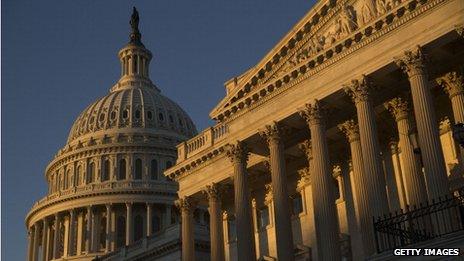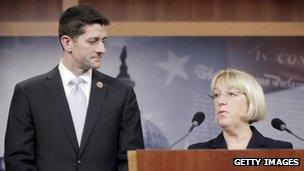US Senate sends budget deal over crucial hurdle
- Published

The US Senate is expected to pass a two-year cross-party budget agreement later this week
A budget bill has passed a US Senate procedural vote, all but guaranteeing its approval this week and averting a government shutdown next month.
In a rare show of cross-party spirit, 12 Republicans joined Democrats to pass the measure 67-33, paving the way for a majority vote later this week.
The two-year budget bill was overwhelmingly approved last week by the US House of Representatives.
President Barack Obama has also backed the budget proposal.
Tuesday's vote exceeded the 60 votes required to overcome a delaying tactic known as a filibuster. It is expected to come up for a simple majority vote on Wednesday.
The Senate's top four Republican leaders - who are in the minority - voted to block consideration of the budget bill, though their opposition was mainly symbolic and they knew the bill would ultimately go forward, analysts say.
If approved, it will go to Mr Obama for his signature.
The proposal was drafted by a cross-party budget committee convened after a 16-day government shutdown in October.
'A smarter way'

Bruised by the shutdown, Republicans and Democrats seem skittish of fresh budget battles - for now
"This bipartisan bill takes the first steps toward rebuilding our broken budget process," Democratic Senator Patty Murray, co-writer of the bill, said.
"We've spent far too long here scrambling to fix artificial crises instead of working together to solve the big problems we all know we need to address."
But the Senate's top Republican hinted a separate brawl was ahead, indicating the party would demand budget cuts in exchange for raising the US government's borrowing limit next year.
"I doubt if the House, or for that matter the Senate, is willing to give the president a clean debt ceiling increase," Senate Minority Leader Mitch McConnell told reporters.
"We'll have to see what the House insists on adding to it as a condition for passing it."
The budget deal, which sets discretionary defence and domestic spending at $1 trillion (£610bn) for the current fiscal year, aims to shave up to $23bn from the nation's $642bn annual budget deficit.
It also rolls back $63bn in military and domestic spending cuts automatically imposed in January when Democrats and Republicans failed to reach a budget compromise.
The new deal does not raise taxes but requires newly hired federal workers to make larger contributions to their pensions.
A federal airport security fee adding $5 to the cost of a typical return flight is also included.
Republican Congressman Paul Ryan, chairman of the House budget committee, said last week the budget deal "cuts spending in a smarter way".
It also helps avoid another government shutdown on 15 January when government funding would otherwise run out.
The October partial government shutdown - which halted many federal services across the country - cost the US economy $24bn, as projected by financial services company Standard & Poor's.
- Published13 December 2013
- Published11 December 2013
- Published17 October 2013
- Published17 October 2013
- Published17 October 2013
- Published9 October 2013
- Published8 October 2013